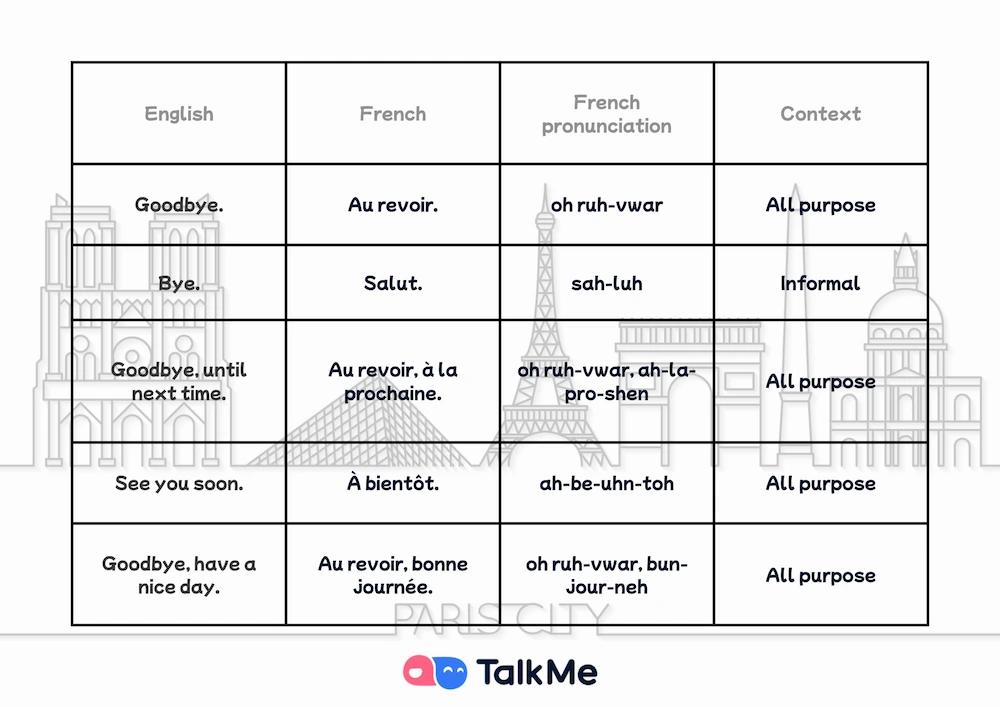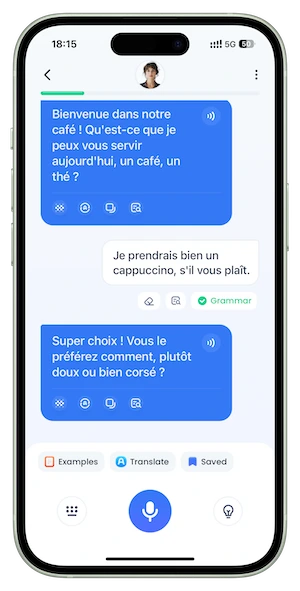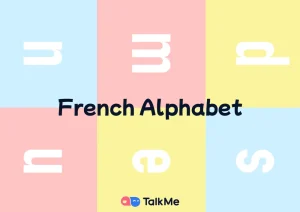Whether you’re traveling to France, chatting with a French friend, or learning the language for fun, knowing how to say goodbye in French is essential. In French culture, the way you say goodbye can leave a lasting impression. It’s not just about parting ways—it’s a gesture of politeness, respect, and connection. Using the appropriate French goodbye helps you blend in, avoid awkwardness, and show cultural awareness. From quick “bye!” moments to heartfelt farewells, mastering the right phrase for each situation shows you’re truly speaking the language—not just translating words.
Using the appropriate French goodbye helps you blend in, avoid awkwardness, and show cultural awareness. From quick “bye!” moments to heartfelt farewells, mastering the right phrase for each situation shows you’re truly speaking the language—not just translating words.
In this post, you’ll learn over 40 ways to say goodbye in French—from standard phrases to slang, email closings, and regional expressions. Plus, there’s a free downloadable poster at the end to help you remember them all.
The Most Common Ways to Say Goodbye in French
Let’s begin with the most widely used expressions. These are the phrases you’ll hear daily in France and across the French-speaking world.
1. Au revoir
This is the classic, go-to French goodbye. It literally means “until we see each other again” and works in almost every setting—formal, informal, professional, or personal.
2. Salut
Wondering how to say bye in French casually? Salut is your best bet. It’s used like “hi” and “bye,” similar to “ciao” in Italian. Use it with friends or people your own age—not in formal settings.
3. À bientôt
This means “see you soon.” It’s friendly and hopeful and can be used in person or in writing. For a slight twist, try À la prochaine (“until next time”).
4. À demain / À lundi
These phrases mean “See you tomorrow” and “See you Monday.” Replace the day to match your next meeting. Simple, polite, and practical.
5. Bonne journée / Bonne soirée / Bonne nuit
These are time-based farewells:
- Bonne journée = Have a good day
- Bonne soirée = Have a good evening
- Bonne nuit = Good night (used when someone is going to sleep)
These closings are a polite way to part, especially when leaving a store, restaurant, or casual gathering.
Formal Ways to Say Goodbye in French
In professional or polite contexts, it’s important to use respectful expressions. These formal goodbyes are common in workplaces, business emails, and meetings with new acquaintances.
6. Adieu
This word means “farewell” and implies a permanent goodbye—often used in dramatic or emotional situations. You might hear it in literature, old movies, or when someone is truly going away for good.
7. Ravi d’avoir fait votre connaissance
This elegant phrase means “Nice to have met you.” It’s great for first meetings, especially in a business or formal setting. Use it when leaving a job interview, conference, or formal dinner.
8. Bonne continuation
Used to wish someone well with their future endeavors—literally, “Good continuation.” It’s polite and supportive, often heard in professional environments or when someone is leaving a role or project.

Slang & Informal French Goodbyes
The French, like any language group, love slang. These fun, casual expressions are perfect for texting, chatting with friends, or sounding like a local.
9. Tchao / Bye / Bye bye
You’ll often hear these borrowed expressions in everyday French. Yes, “bye bye in French language” is literally bye bye! It’s informal and friendly—just don’t use it in a formal context.
10. Je me casse
Literally “I’m breaking out (of here),” this is super slangy—think “I’m outta here.” Only use it among close friends.
11. On se tient au jus
Slang for “Let’s keep in touch.” Very conversational, often used between young people or colleagues who are friendly.
12. À plus dans l’bus
This funny rhyme means “See you later on the bus.” It’s silly, playful, and popular among teens. The shorter version À plus (pronounced ah ploos) is more widely used.
13. À tout’
A clipped version of À tout à l’heure (“see you later”), this slangy farewell is casual and trendy.
How to Sign Off Emails in French
Saying goodbye in writing is just as important. French email etiquette often requires more formality than English.
14. Bien cordialement / Cordialement
These are the most common closings for professional emails. Equivalent to “Best regards” or “Sincerely.”
15. Amitiés sincères / Affectueusement
Use these for personal emails. Amitiés sincères means “Sincere friendships,” while Affectueusement is like “Affectionately.”
When in doubt, go more formal, especially if you’re writing to someone for the first time.
5 Must-Know Goodbyes for Beginners
Just starting out? Master these 5 essential expressions to confidently navigate any conversation:
- Au revoir – the all-purpose goodbye
Salut – casual and friendly - À bientôt – “See you soon”
- À plus – “Later!”
- Adieu – for dramatic or permanent farewells
Regional & Borrowed Expressions
French is spoken around the world, and each region adds its own flavor. You might hear:
16. Ciao – from Italian, used in Southern France
17. Hasta la vista – from Spanish, playful or humorous
18. J’y go – Franglish for “I’m going,” often used in Quebec or among younger speakers
These expressions are fun but not universally accepted in formal situations. Use with care!
Cultural Etiquette of Saying Goodbye in French
French culture places great importance on greetings and farewells. Here are a few unwritten rules:
- Utilisation vous with strangers or in formal situations, and tu with friends or children.
- La bise (cheek kisses) is common among friends and family—usually two kisses, sometimes more depending on the region.
- In business, a firm handshake is the standard goodbye.
- Never leave a gathering without saying goodbye to everyone—it’s considered rude.
Saying Goodbye with Emotion
When parting ways with someone close or in an emotional situation, add a little extra warmth.
19. Je t’embrasse / Bisous
Both mean “kisses.” Use with friends and loved ones in writing or speech.
20. Bon courage
Literally “Good courage,” this expression means “Hang in there” or “Good luck.” It’s kind, encouraging, and shows you care.
21. À un de ces quatre
Slang for “See you one of these days.” Casual and nostalgic—great for long-distance friends.
Bonus: Want to say goodbye with music? Try listening to French songs like “Adieu” by Cœur de Pirate or “Au Revoir” by Mark Forster ft. Sido.
Learn French Goodbyes with TalkMe AI
Want to practice these phrases and sound like a native? TalkMe AI is your ultimate French tutor. With real-life conversation practice and smart AI feedback, you’ll learn how to say goodbye in French naturally and confidently.

Avec TalkMe AI, vous pouvez :
- Simulate real conversations for travel, work, and daily life
- Get cultural tips on formal vs informal language
- Receive feedback on grammar, pronunciation, and tone
- Explore themed lessons like “Greetings & Goodbyes”
- Download free resources, like our “Say Goodbye in French” poster!
It’s your personal French coach, available anytime.
Dernières paroles
There are many ways to say goodbye in French—and each one adds nuance to your communication. From au revoir to tchao, knowing which expression to use helps you connect authentically and respectfully.
Don’t worry if you mix them up at first. The important thing is to try. As with all language learning, practice makes perfect.
Final tip: Speak aloud daily with TalkMe AI—you’ll sound like a local in no time!


